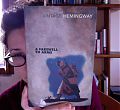
Ernest Hemingway
A Farewell to Arms
Hemingway is one of the big names I haven’t touched. I suppose he hasn’t interested me until now, until reading John Cheever and wanting to read his literary mentors. And it was a shock, well not really a shock, to realize that I was filling a great blank in the chronology to modern and contemporary literature. Hemingway has inspired many more than just John Cheever.
Hemingway’s prose is, as the short intro insists, “deceptively simple.” It is sparse and pared down, it rarely uses adverbs and tries to avoid commas, preferring “and… and… and” instead. There are few inner dialogues, but many undescriptive descriptions and lyricism in repetition.
At first I was slightly turned off, the dialogue was so curt, there were no revelations of character that I so admire. But as I read on I began to picture the prose like a late Mondrian painting. I began to see the starkness like the painted thick black lines either horizontal or vertical. By cutting down on the elements, emotion and action stand out more obvious. And as the novel worked to the end I realized just how powerful the device was and how accurately the action and emotion of love and war had been depicted.
And maybe because of the strength of that emotion, or maybe because of the tragedy of the story itself, I cried like a baby at the end. What sadness! And I don’t want to give it away, so I’ll go straight to the war scenes and the idyll of love that Hemingway created.
I was always embarrassed by the words sacred, glorious, and sacrifice and the expression in vain. We had heard them, sometimes standing in the rain almost out of earshot, so that only the shouted words came through, and had read them, on proclamations that were slapped up by bill posters over other proclamations, now for a long time, and I had seen nothing sacred, and the things that were glorious had no glory and the sacrifices were like the stockyards at Chicago if nothing was done with the meat except to bury it.
In A Farewell to Arms there is no false sentiment towards war or love. The young narrator speaks of war and preforms his wartime duty with the seriousness war demands. And when the duty cannot be done anymore, he leaves war and is done with it. Yet the novel itself is never serious. It is a tender portrait that speaks the truth.
But we were never lonely and never afraid when we were together. I know that the night is not the same as the day: that all things are different, that the things of the night cannot be explained in the day, because they do not then exist, and the night can be a dreadful time for lonely people once their loneliness has started. But with Catherine there was almost no difference in the night except that it was an even better time.
Best I don’t start thinking about the love between Catherine and Henry again, lest I start to cry again.
· · · · · · · · · · · · · · · · · · · ·